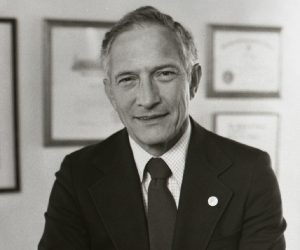A scuba diver, a pilot, an inventor and what not? Known as the Mayor of the Silicon Valley, the legendary inventor Robert Noyce made his mark in the history of Semiconductors. Noyce was a sharp student and had shown his traits as an inventor, from his childhood. From building a boy-sized aircraft to creating a transistor from scratch, he always loved playing with machines. Having a sharp mind, he also gained the name Rapid Robert from his classmates. This remarkable physicist had brought a revolution in the field of personal computers with its the first integrated circuit and gave Silicon Valley its name.
Early Life
Robert was born to Rev. Ralph Brewster Noyce and Harriet May Norton, on 12 December 1927, in Burlington, Iowa. He was the third of his three siblings, Donald Sterling Noyce, Gaylord Brewster Noyce and Ralph Harold Noyce. Noyce was a brilliant student, and was also, good at other co-curricular activities like sports, acting and singing. He completed his high school from Grinnell High School and enrolled himself into the physics course in Grinnell College. During his school days, he excelled in mathematics. Later, he joined MIT and received a PhD in solid-state physics in 1953.
Early Career
During his PhD, Noyce found his interest in transistors. After the completion of his PhD, he joined Philco Corporation in Philadelphia as the research engineer. In 1956, he left the job at Philco and joined the Shockley Semiconductor Laboratory in Mountain View, California, owned by the co-inventor of transistor and Nobel prize winner, William Shockley. He worked there for a year and left the company with the infamous ‘traitorous eight’ on having a dispute with William Shockley, on his way of working.
Founding Intel
After quitting the Shockley Semiconductor Laboratory, he co-founded a semiconductor company named Fairchild Semiconductor, with Sherman Fairchild, the owner of Fairchild Camera and Instrument, in 1957. At Fairchild Semiconductor, Noyce co-invented the first Integrated Circuit built with Silicon. During the invention of this IC, he also developed a planar process, that made it easy to develop the transistors at a lower cost.

Working for 9-long years, Noyce left the Fairchild Semiconductors and co-founded NM Electronics, with his former co-worker, Gordon Moore, from Shockley Semiconductor Labs, in 1968. Later, NM Electronics was renamed to Intel Corporation. Noyce served as the President of Intel till 1975 and in 1978, chaired the board of directors of Intel, till 1978.
The team intel invented the first commercially successful product, the 3101 Schottky bipolar 64-bit static random access memory (SRAM) chip, in May 1969. In 1971, Intel made the first single-chip microprocessor in the world, that made Intel more famous, that ignited the personal computer revolution.
Noyce was popular for his working style and employee administration, that was the main reason of his leaving the Shockley Semiconductor Labs. He provided the employees with rewards and bonuses to encourage teamwork. He created a relaxed working environment for the employees, and avoided any type of luxuries, to maintain equality among every employee.
In 1978, he left Intel and joined the Semiconductor Industry Association (SIA) as the chairman. In 1988, Noyce decided to get retired and established an association named SEMATECH, a semiconductor manufacturing consortium with the help of SIA and held the position of the President of the company.
Personal Life and Death
Noyce married Elizabeth Bottomley in 1953 and had four children with her. The two got divorced in 1974. Noyce on 27 November 1974, got married to Ann Schmaltz Bowers, who became the first Director of Personnel for Intel Corporation.
On 3 June 1990, Noyce died of heart attack, at the age of 62.
In his life, Noyce kept himself busy in various inventions and got his name recorded as a great inventor. He received many awards for his contribution to the technology, including the Stuart Ballantine Medal in 1966, IEEE Medal of Honor in 1978, National Medal of Science in 1979 and National Medal of Technology in 1987.

Yashica is a Software Engineer turned Content Writer, who loves to write on social causes and expertise in writing technical stuff. She loves to watch movies and explore new places. She believes that you need to live once before you die. So experimenting with her life and career choices, she is trying to live her life to the fullest.